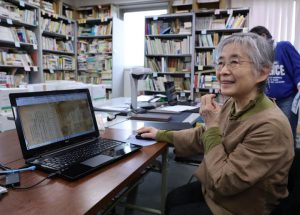No More Hibakusha Project, aimed at inheriting memories of A-bomb survivors, commemorates 10th anniversary
Dec. 20, 2021
Facing infrastructural and financial challenges, group works to digitize materials for future generations
by Masaharu Nakagawa, Staff Writer
Ten years have passed since the establishment of the non-profit organization “No More Hibakusha Project.” In an attempt to “inherit” the memories of survivors, the Tokyo-based NPO has devoted itself to collecting and communicating A-bomb survivor testimonies of the bombing and records of campaigns aimed at the abolition of nuclear weapons. The organization is busy sorting, at two locations, 20,000 materials including those held by the Japan Confederation of A- and H-bomb Sufferers Organizations (Nihon Hidankyo). Members of the NPO have reiterated the organization’s stance that “materials related to the A-bomb survivors’ movement represent the history of confronting the devastation caused by the atomic bombings.” The group is determined that the “materials be passed on to future generations instead of being scattered and lost.”
The No More Hibakusha Project was founded in 2011 by, among others, Kenzaburo Oe, a Nobel laureate in literature, and the late Mikiso Iwasa, a Hiroshima A-bomb survivor who served as co-chairperson of Nihon Hidankyo. The NPO has collected records and publications about the experiences of A-bomb survivors living in different parts of Japan and documents belonging to Nihon Hidankyo, which has long campaigned to communicate the horror of nuclear weapons. Using scanners, the NPO is converting such materials into a digital archive and posting a list of materials on its website.
The work is being done at the organization’s offices in Tokyo’s Minato Ward and an archival storage space in Saitama Prefecture’s Saitama City. Among the materials is a draft of the “Basic Demands of the Atomic Bomb Survivors,” a document, announced by Nihon Hidankyo in 1984, that served as the foundation of the A-bomb survivors’ movement. Repeated revisions to the draft appear to have been made by black ballpoint pen. As an example, the phrasing “A-bomb survivors cannot but strain their voices” in the original draft was edited to “A-bomb survivors can no longer stay silent.”
Utilizing the materials, the NPO has recently held symposiums and exhibits. In the fall of last year, students at Showa Women’s University in Tokyo held an exhibit explaining the history of the A-bomb survivors’ movement. Since fiscal 2012, such students have helped organize a total of 6,713 materials. Yoshie Kurihara, 74, a resident of Tokyo’s Arakawa Ward, is a member of the organization’s secretariat. “This has become a model case in which A-bomb experiences are passed on to future generations at the same time the materials are being collated,” said Ms. Kurihara.
On the other hand, the volume of materials is so overwhelming there are simply not enough staff members to do the work of classification and systemization. Another challenge is how to create the infrastructure that would enable confirmation of personal information and copyrights before the materials are made public. When it was first established, the NPO visualized creation of a “memory archives,” where such materials and documents could be accessed by users. But with estimates of construction and operating costs reaching about 600 million yen (or, more than 5.0 million U.S. dollars), the prospects for financing a facility and selecting candidate sites are nowhere in sight.
Commemorating its 10th anniversary, the NPO held an online meeting with A-bomb survivor groups throughout Japan on December 11, discussing the efforts needed to pass on A-bomb survivors’ experiences. Kazuhisa Ito, 74, head of the secretariat and a resident of Kokubunji City in Tokyo, said, “How to pass on A-bomb accounts and materials related to the movement is left up to the public. Learning about not only ‘that fateful day,’ August 6, but also about how survivors lived their lives afterward should enable us to better convey the tragic reality of the devastation caused by the atomic bombings.”
(Originally published on December 20, 2021)








